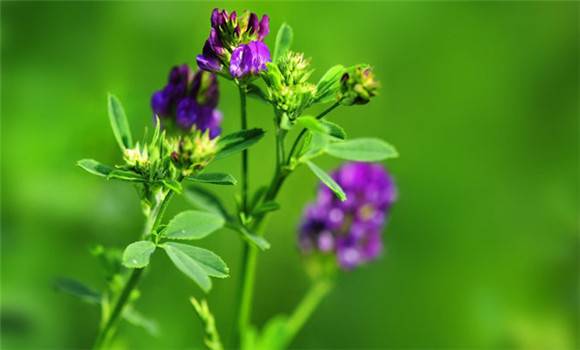Alfalfa Leaf Extract 40% Saponins
Source:Alfalfa Aerial Parts
Latin Name:Medicago sativa L.
Active Ingredients:Total Saponins
Assay:40%
Testing Method:UV
Appearance:Brown Yellow Powder
Pesticide Residue:Comply with (EC) No 396/2005 Standard
- Description
- Data Sheet
- Certificate
-
What is Alfalfa Leaf Extract Saponins?
Alfalfa Leaf Extract Saponins are unique bioactive substances extracted from alfalfa, which are cyclic acetals formed by the dehydration and condensation of hydroxyl groups of sugar hydroxyl groups or hydroxyl groups of non-sugar compounds with an acetal chain (glycoside chain). Alfalfa contains nearly 60 kinds of saponin components, all of which are oleanoid-type pentacyclic triterpenes.
The content of saponins in alfalfa varies depending on the species, site, and growth period. Although the proportion of total saponin content in flowers and seeds is higher, the yield of both is small and low, and the proportion of total saponin content in alfalfa leaves is about the same as that in seeds. Hence, the leaves are a better material for extracting alfalfa saponins. The content of alfalfa saponin is highest in the shoot stage and lowest in the withering stage. With the prolongation of the growth cycle, there was a tendency to decrease gradually.
Green Spring Technology supplies Alfalfa Leaf Extract 40% Saponins, which is made by chopping, extracting, filtering, concentrating, alcohol precipitation, drying, crushing and sieving process. It has passed foreign ID tests, heavy metal, solvent residue, microorganisms, and PAHS under European Pharmacopoeia, Japanese Pharmacopoeia, American Pharmacopoeia and other international standards.
Established in 2000, Green Spring Technology is committed to providing customers with natural, safe, and organic plant extracts. It organizes production under ISO, HACCP and other quality standards. It has obtained 7 certificates and 7 patents, and its products are sold in more than 62 countries worldwide, serving more than 2,450 customers and are well received.
Specification:
Product Name
Alfalfa Extract
Latin Name
Medicago sativa L.
Source
Alfalfa Aerial Parts
Active Ingredients
Total Saponins
Specification
40%
Testing Method
UV
Appearance
Brown Yellow Powder
Pesticide Residue
Comply with (EC) No 396/2005 Standard
Regulation:
It conforms to EU regulations.
Looking for a Quotation?Benefits:
Abatement of Atherosclerotic Plaque
Alfalfa extract saponins promote atherosclerotic plaque. NO is known to play a key role in maintaining vascular homeostasis, and it can inhibit the formation of atherosclerosis by inhibiting the activation and adhesion of leukocytes, preventing platelet adhesion and aggregation, inhibiting the proliferation of smooth muscle cells, and preventing the formation of foam cells. Alfalfa extract saponin can prevent the effect of atherosclerosis formation by promoting the release of NO from endothelial cells, thus proving to a certain extent the mechanism by which alfalfa saponin promotes the regression of atherosclerotic plaques.
Lowering Blood Lipid
Research has pointed out that alfalfa contains an active ingredient called "phytosaponin", which has a great affinity for cholesterol and can combine with cholesterol to form a kind of insoluble complex, reducing the absorption rate of the human body, thus playing a role in lowering blood lipids.
Deworming the Rumen of Cattle and Sheep
Some tests have shown that protozoa affect the turnover of 88% of bacterial proteins, and deworming protozoa can increase the total bacterial count in the rumen of sheep. Alfalfa extracts alfalfa saponins had an effect on rumen protozoa in sheep and was related to diet type. The addition of 2% and 4% alfalfa saponins to diets based on roughage reduced protozoa by 34% and 47%, while the addition of 2% and 4% alfalfa saponins to diets based on concentrates reduced the total number of protozoa by 33% and 76%, respectively.
Promote Protein Synthesis and Deposition in Livestock
Alfalfa extract can enhance the ability to synthesize proteins in piglets and chicks, and at the same time improve the absorption and utilization of nitrogen, so that the metabolites of nitrogen will be reduced significantly, which will be conducive to the synthesis and deposition of proteins.
Lowering Cholesterol and Lipid Levels
Studies have shown that alfalfa extract saponin can significantly reduce serum cholesterol in hypercholesterolemic rats and significantly promote the clearance of low-density lipoprotein (LDL) by the non-receptor pathway (monocyte-macrophage system), suggesting a more meaningful pathway to find an effective drug for the treatment of familial hypercholesterolemia (FH).
It was confirmed that alfalfa saponin could convert rat liver cholesterol to bile acids in large quantities. Rats fed alfalfa saponin showed a significant increase in the net excretion of total and acidic sterols in the feces compared with the control group, suggesting that alfalfa saponin has the effect of blocking the enterohepatic circulation of bile acids, thus promoting the excretion of cholesterol from the body. Saponins can reduce organ and plasma cholesterol levels in animals and humans. Alfalfa seeds in the saponin in clinic to reduce human blood cholesterol and triglycerides, but also through the improvement of coronary blood circulation and reduce coronary heart disease patients angina pectoris.
Applications:
For Health Products:
Extracts of alfalfa seeds and leaves have been shown to have antimicrobial, antioxidant, immunomodulatory, and cholesterol-lowering properties and have been used as ingredients in nutraceuticals.
For Feed Product:
Alfalfa extract is often used as an immunomodulator to enhance the disease resistance of poultry, and it can improve the intestinal environment of poultry, increase feed remuneration, and improve the quality of meat and eggs, and it has been used in poultry production. It has been reported that the addition of alfalfa extracts to broiler chickens' diets can promote the proliferation of peripheral blood, thymus, and spleen T-lymphocytes and bursa B-lymphocytes, and there is a dosage relationship between them, which suggests that alfalfa polysaccharides can improve the immunity level of broiler chickens, thus improving their disease resistance.
-
Download
Alfalfa Leaf Extract 40% Saponins COA


 English
English French
French Spanish
Spanish Russian
Russian Korean
Korean Japanese
Japanese










